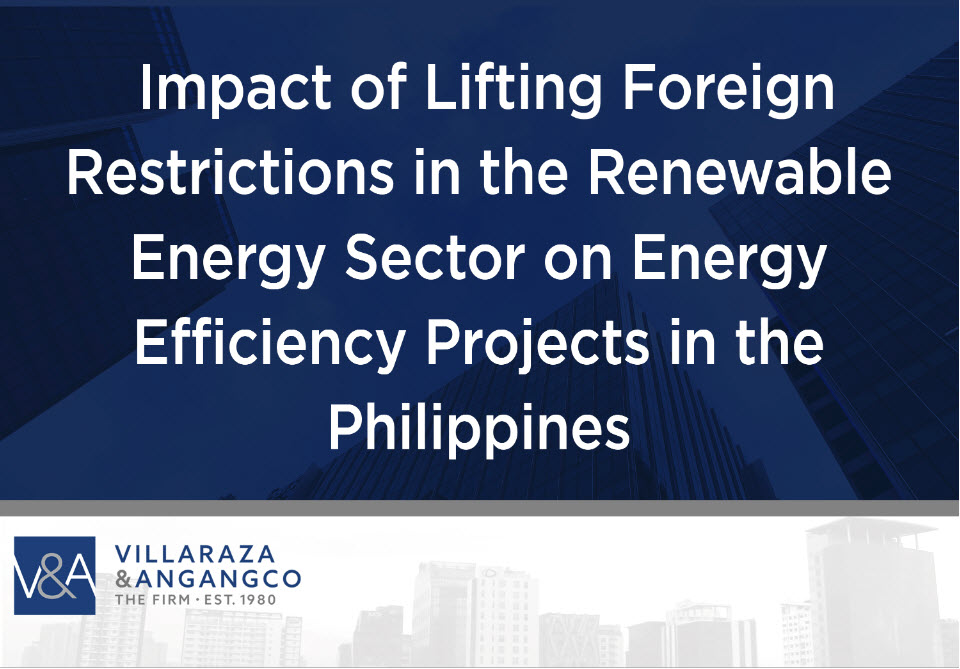

Impact of Lifting Foreign Restrictions in the Renewable Energy Sector on Energy Efficiency Projects in the Philippines
On 12 April 2019, the Philippine Congress approved the Energy Efficiency and Conservation Act (“EECA”) to promote and encourage the development and utilization of efficient Renewable Energy (“RE”) technologies and systems to ensure optimal use and sustainability of the country’s energy resources through energy efficiency (“EE”) projects. The EECA defines “Energy efficiency” as the “way of managing and restraining the growth in energy consumption resulting in the delivery of more services for the same energy input or the same services for less energy input.” Consequently, the EECA defines “[E]nergy efficiency projects” as “projects designed to reduce energy consumption and costs by any improvement, repair, alteration, or betterment of any building or facility, or any equipment, fixture, or furnishing to be added to or used in any building, facility, or vehicle including the manufacturing and provision of services related thereto: Provided, That such projects shall be cost-effective and shall lead to lower energy or utility costs during operation and maintenance.” Based on the definition, EE projects involve any system that lowers cost and energy for the purpose of maximizing the delivery of services or lowering energy input.
Lifting of Foreign Restrictions on Renewable Energy Activities
On 15 November 2022, Section 19 of the Implementing Rules and Regulations (“IRR”) of the Renewable Energy (“RE”) Act of 2008 (“RE Act”) was amended through the issuance of the Department of Energy (“DOE”) Department Circular No. 2022-11-0034. The DOE Circular lifted the limitations on foreign participation to engage in the exploration, development and utilization (“EDU”) of the Philippines’ RE sector. Prior to the issuance of the DOE Circular, the IRR of the RE Act limited participation in the EDU of RE resources in the country to Philippine citizens, or corporations or associations at least sixty percent (60%) of whose capital is owned by Filipinos. As a result of the lifting of foreign restrictions on participation, the DOE expects an increase in foreign investments in the RE sector of the country.
Impact on Foreign Investments
The EECA seems to separate itself from RE project; thus, the full liberalization of the RE sector to foreign investors does not directly benefit the promotion of EE projects. For instance, the definition of EE projects is limited to “improvement, repair, alteration, or betterment” of any asset that would result in the efficient use of energy. Thus, as compared to RE systems, EE projects do not refer to systems that convert RE resources into energy. In addition, unlike RE projects, the EECA does not impose nationality restrictions on EE projects. As confirmed by the Inter-Agency Energy Efficiency and Conservation Committee, foreign investors are already free to venture into EE projects without the IRR amendment. Finally, RE and EE projects are entitled to a separate set of fiscal and non-fiscal incentives, governed by different laws and regulations, and supervised by distinct government agencies.
Nonetheless, there are some RE projects which are also considered as EE projects. For those projects that convert RE resources into energy, the full liberalization of the RE sector to foreign investors would allow foreign entities to enter into both RE and EE projects in the Philippines.
Moving forward
Nonetheless, liberalizing the RE sector to foreign investors stimulates the economy which opens a lot of opportunities for EE projects due to the expected proliferation of RE projects. While the Philippines remains enriched with RE resources, it is equally important to maximize the use of energy to promote cost savings, battle climate change and conserve environmental resources. Indeed, the influx of foreign investments would lead to more business opportunities and in turn, unlocks the untapped market potential of the RE sector.
~o0o~
For any questions or legal concerns relating to Energy Efficiency Law, you may contact:
|
Richard Henrick I. Beltran
Partner
ri.beltran@thefirmva.com
|
Fritz Julius V. Casama
Senior Associate
fj.casama@thefirmva.com
|
Christian Justin B. Streegan
Associate
cb.streegan@thefirmva.com
|
This article is intended for informational purposes only and should not be construed as legal advice.